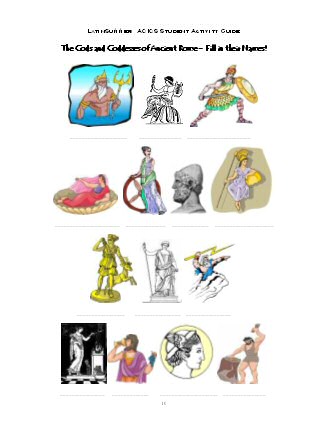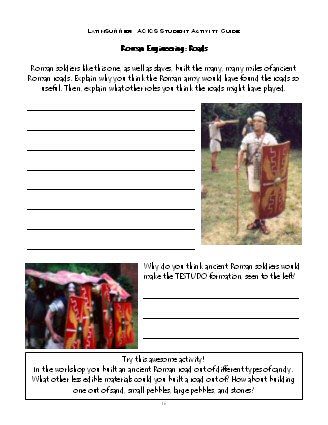Roman Explorers: Curriculum
Our workshop curriculum includes study of the Latin language, Roman culture, ancient mythology, and English derivatives from Latin roots. Students are encouraged to think critically and creatively about Classics, and to discover the intersection between the ancient and modern worlds.
Each student receives a 20-page activity guide, which includes materials that will be used during the workshop itself as well as materials for further exploration at home. Click on the images below to download sample pages from the activity guide.
Each half-day workshop consists of 4-5 sessions; a full-day workshop consists of 8-10 sessions. The client may choose from any of the sessions below. Any combination of sessions is possible! Additionally, we can develop new sessions to meet the specific interests of the client.
Click here to watch clips of sample lessons from our curriculum!
Latin Language Sessions
Introduction to Latin Greetings (L-1)
Students will kick off the workshop with a brief introduction to the spoken Latin language. Students will learn simple Latin greetings.
They will introduce themselves to each other in Latin and take part in fun skits in which they use their Latin.
Latin Alive! (L-2)
Want to give your students a taste of the Latin language, beyond greetings? Want to harness a bit of Latin's potential as a
language-skills builder? Latin Alive uses an array of engaging kinesthetic, tactile, and visual methods to quickly introduce students
to major Latin vocabulary words. Students will have a blast as they explore these words. We then build students' confidence with language
by leading them through actual Latin stories that they can read and understand! Counts as two sessions due to length.
Mythology Session
Mythology Through the Arts: Mars/Jupiter (M-1)
We will explore the deities of ancient Rome, focusing on either the god of War, Mars, or the king of the gods, Jupiter. We will attempt
a character sketch of Mars/Jupiter based upon his representations in ancient and modern visual arts and music, specifically Gustav Holst's
The Planets Symphony.
Roman Culture Sessions
Roman Art: Mosaics (C-1)
Students get a hands-on introduction to one of the most beautiful and complex types of Roman art, mosaics. Constructed with tiny stone or
glass tesserae, these richly-colored mosaics, have survived for many years. After examining examples of mosaics, students make 100% edible
mosaics!
Roman Engineering: Roads (C-2)
Thousands of years ago, the Romans built more than 50,000 miles of roads throughout Europe, the Middle East, and North Africa. These roads
were so well constructed that they serve as the base for many modern roads. Students will examine how Roman roads were built, and will
devise their own edible yet accurate roads using candy. All roads lead to Rome!
Roman Banquet (C-3)
Students will enjoy an "authentic" Roman banquet, feasting on such
Roman goodies as cheese, olives, and grape juice! Further, students will be dressed in accurate replicas of ancient Roman clothing, such as
togas, tunicas, stolas, and pallas, to help students understand what the Romans would have worn to banquets.
Roman Architecture (C-4)
The architecture of the ancient Romans is one of the most lasting and influential elements of their society. From the dome to the
pediment to the arch, we see examples of such architecture on a daily basis. Students journey through a visual exploration of major
architectural forms in ancient and modern architecture. They conclude their trip by constructing a Roman aqueduct!
Greek Sessions
Introduction to Greek Language (G-1)
Students will learn how to read the letters of the Greek alphabet and practice pronouncing words. Through a set of fun and exciting activities
from one of our latest publications, Getting to Know Greek, students will learn how to greet each other and
read simple sentences in Greek!
Athenian Comedy & Tragedy (G-2)
Want to show your students how people entertained themselves before the days of radio, television, and video games? In this session, students will
learn about plays in ancient Athens and perform a small play for the rest of the class using realistic Greek masks as costumes!
Word Study Sessions
Common Derivatives (WS-1)
The perfect introduction to Latin's influence on the English language. Students learn important Latin root words that serve as the
basis for numerous commonplace and complex English words. Through creative games and activities, students will learn the skills necessary
to increase their vocabulary!
Anatomical Terms (WS-2)
Latin words for the body parts serve as the roots for many modern English anatomical and medical terms. Students will learn the necessary
Latin words, using kinesthetic activities (such as piecing together a skeleton and tracing and labeling their own bodies!) to practice their
knowledge.
Scientific Terms (WS-3)
The field of science has borrowed heavily from the Latin language. We will introduce students to common scientific root words and their
meanings, which will allow students to deduce the meanings of challenging scientific terms. To practice their knowledge in a fun way,
students will play the role of scientists naming mysterious (and not-so-mysterious!) animals and plants.
Prefixes (WS-4)
A knowledge and understanding of prefixes can be the key to understanding the meanings of many English words. Latin prepositions
serve as the roots for a great number of prefixes. Students will learn and practice the Latin prepositions through games and activities. They
then will explore new English words derived from their newfound Latin vocabulary.
Numerical Terms (WS-5)
The Latin numbers are at the root of the number systems in many different languages, including English. Through songs and activities,
students will learn the Latin numbers from 1-10, 100, and 1000. Students then will explore the meaning of English words derived from
these Latin numbers, and complete a hands-on project solidifying and utilizing their new knowledge.







